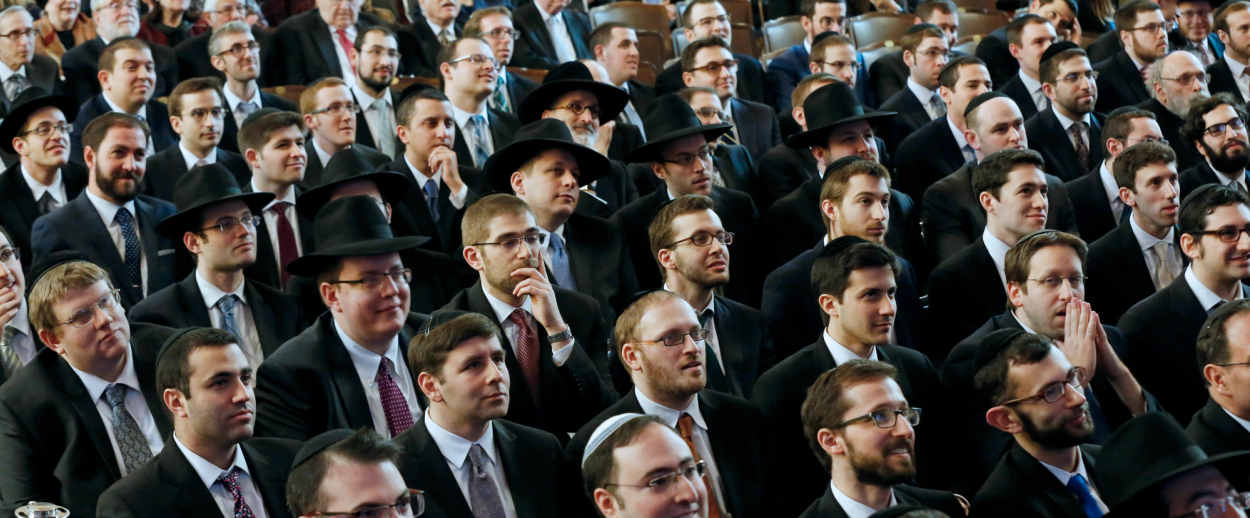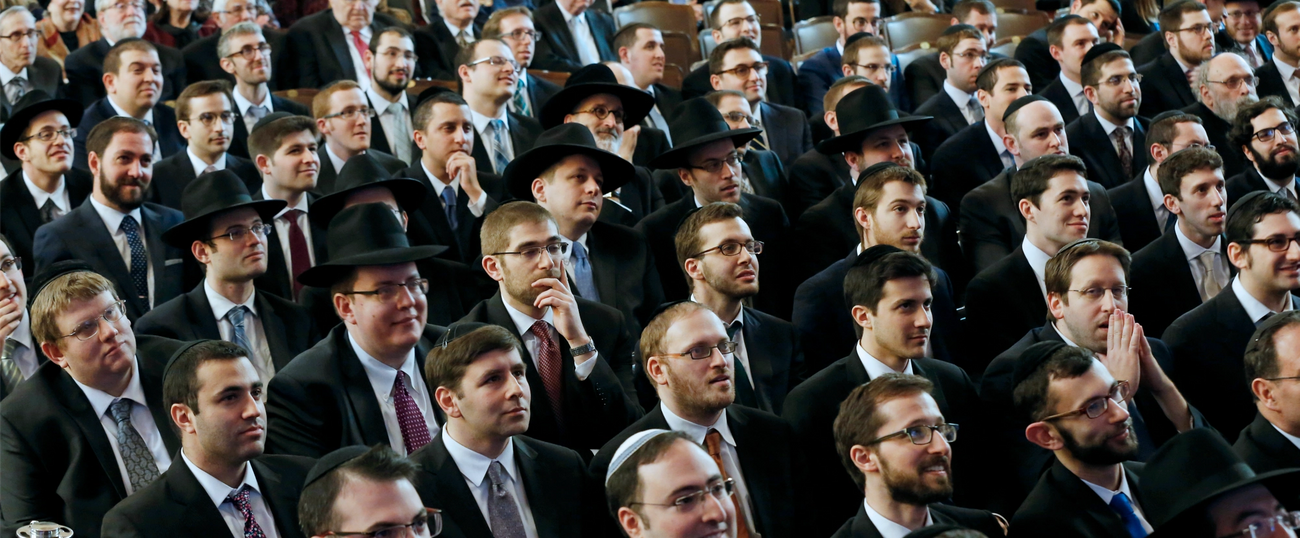What Does it Take To Be a Transformative Rabbi?
The president-elect of Yeshiva University shares a message with his newest graduates as they begin their rabbinic careers




Editor’s note: The following remarks were delivered at the Chag ha-Semikhah, the convocation to ordain rabbis, at Yeshiva University in New York City, March 19, 2017.
Over the course of the last few months I have had the great pleasure to meet a number of Yeshiva University’s fine rabbinical graduates. Allow me to share the story of one particular encounter.
A number of weeks ago, I was introduced to a young man and I asked him to tell me a little bit about his time in the Rabbi Isaac Elchanan Theological Seminary. He replied by recounting to me a very difficult situation that arose in the course of his family life several years ago. Even with the distance of time it was clear that this situation was too emotionally charged for him to describe in great detail. But whatever the exact circumstances, it the situation required expert halakhic guidance. So he approached his teacher, one of the senior roshei yeshiva in this institution, explained the situation, and asked him for his counsel.
“Do you know what his response was?” the young man asked me.
“My rebbe began to cry. It was one of the darkest moments in my life. There was not much that anyone could give me. But he gave me his tears. My family and I look back on that difficult time with much grief and regret. But completely intertwined with that experience is the memory of a rabbi who both answered my halakhic question and honored my pain. We will never forget that as long as we live.”
This is the story of a person whose life was transformed by his encounter with a rabbinic leader and it raises a broader question. What does it mean to be a rabbi? What does it take for a rabbi to be a transformative force in this world?
The answer may lie in a crucial Talmudic teaching. The Torah commands: “Love the Lord your God” (Deuteronomy 6:5). While this verse appears straightforward, the Gemara (Babylonian Talmud, Yoma 86a) cites a rabbinic interpretation that points to an additional layer of meaning.
It is taught: “Love the Lord your God,” such that the name of God should become beloved through you.
How can a mere human being make God’s Name even more beloved? The gemara continues:
One should read Torah, and study Mishnah; serve Torah scholars; and be pleasant in all one’s personal interactions.
Follow this tripartite formula, the Talmud advises, and the name of God will become more beloved in the world.
There is a debate among the Talmudic commentators over how to interpret this teaching. The simple reading of the Gemara, which appears to be accepted by all of the medieval authorities who simply cite it verbatim, is that it comprises part of the general command to love God. As such it applies to each and every Jew. Rambam, however, prescribes this teaching as a requirement for “a person of great wisdom,” and places it specifically in the context of the mitzvah of kiddush Hashem, the sanctification of God’s Name. The notion of a sliding scale of behavioral expectations, depending on how learned one may be, is part of a larger theme in Rambam’s works. But for the moment I wish only to highlight that according to Rambam, the sage is not only required to adhere to a higher standard of conduct, but is also distinguished by a unique set of opportunities. In this case, the one who is recognized as a chakham, a sage, possesses an extraordinary opportunity to sanctify God’s Name in this world. People judge religion by its adherents. Their experiences of Judaism, Torah and God are shaped and inspired by their interactions with His messengers. On some level this applies to all of us who are clearly identified as Jews, but it applies even more so to rabbis. As such, the very idea of receiving semikhah, rabbinic ordination, carries with it great consequences. For each of you today who are being publicly recognized as musmakhim—ordained rabbis—are not only being rewarded for your years of Torah study, but are also being granted an enormous opportunity to fundamentally alter the world in which we live.
How can you best capitalize on this opportunity? How can you most effectively utilize your strengths to sanctify God’s Name in this world? Using the Gemara as a homiletical guide, allow me to suggest a three-pronged strategy.
First, you must speak with chokhmah—with wisdom—and to do this you must learn deeply: “Read Torah and study Mishnah.”
Your greatest resource is the Torah; your greatest strength is that you represent a three thousand year old tradition. You must be sure to do so judiciously and authentically. And so you must be learned. You have already succeeded in completing a rigorous process of semikhah that required you to have displayed a mastery of Torah. But you must continue your studies. The vistas of Torah are vast, and you must explore them with great passion and vigor.
But more than just developing as lamdanim, as rabbis you also need to develop a deep understanding of the broader world and modern reality. You will need to speak directly to the hopes and concerns of this generation, in the words of Matthew Arnold “to the thoughts which make the furniture of their minds,” and directly relate to the specific challenges and opportunities of our times. Now, this may sometimes require you to challenge some elements of contemporary culture. But to be an effective and respected countercultural voice as opposed to one who is written off as simply out of touch you will need to acquire a deep familiarity with the intellectual and cultural milieu of our day.
In this context, in order for one to speak with chokhmah, one needs to have deep insight into both Torah and reality.
The gemara’s second suggestion is to act with anavah—with humility: “Serve Torah scholars.”
Know what you know and know what you do not know. As the Mishnah says, the wise man is not the one who knows everything but the one who continuously learns from others. Be secure enough in yourself to seek advice and counsel.
This is of course true in respect to your rabbis, teachers and peers. You have a large support network here at Yeshiva University that will always be ready to assist you. I myself, all throughout my years in the rabbinate until today, have been deeply blessed with the ability to turn to my rabbis and teachers at Yeshiva University as resources and guides to help me think through challenges of great complexity and consequence. But it is also true of your lay leadership, parents, and students. Our community is filled with thoughtful professionals, sensitive parents, and people of substance with a wealth of experience. They have much to offer and much from which you can learn. Take advantage of their insight. Learn from their life lessons. They are not just your parishioners, they are your partners.
You will need to lead, and speak with wisdom, but also approach your new role with the humility to learn from all those around you. Impart chokhmah; exude anavah.
The gemara’s third and final suggestion is to behave with ahavah, with love: “Be pleasant in all one’s personal interactions.”
I only began genuinely to understand the possibility of loving someone outside of one’s family as oneself after working as a rabbi, for my community became my extended family. Working with them day and night building our synagogue, facing deficits and challenges, formulating ambitious plans for expansion and success; grieving with them over the loss of a loved one, adding a name to a sick child who suddenly fell perilously ill or celebrating the birth of a child to a couple who previously thought that they would never have children. I thought of them in my personal prayers, spent sleepless nights considering ways to ease their troubles, and felt true joy upon hearing of their triumphs. This, too, is what you have learned by example from your rebbeim and teachers at Yeshiva – that the responsibility of the rabbi, educator and spiritual guide is to love one’s students and congregants, to be moved by them and inspired by them.
If you are to be rabbis, you must impart chokhmah, exude anavah…but you must live with ahavah, with love.
And if you do so, you will make God’s Name more beloved in this world.
You our dear students have an enormous gift and opportunity, and this is especially true today. There are those who think that in today’s climate of nihilistic individualism, in which claims to authority or transformative leadership are mocked, the role of the rabbi, educator and spiritual guide is diminished. But in truth the opposite is the case. These roles are even more necessary today. People naturally seek meaning and purpose; they will always find their role models and sources of inspiration. The question is whether they will find it outside of our tradition or within our tradition. The rabbi is certainly needed, but what kind of rabbi? What does it take for a rabbi to be a transformative force in this world?
Today, perhaps more than ever before, it is to embrace this formula of chokhmah, anavah and ahavah. It is the rabbi who speaks with sophistication and humility; who views the Jewish world not through the prism of allies and adversaries, but of partners and potential partners. It is the rabbi who when faced with a halakhic dilemma responds not only to the question but also to the person; who not only has the depth of knowledge to know the answers but also the humanity to cry. It is the rabbi who is not fueled by fury or self-righteousness but by love, care and concern.
It is this kind of rabbi who is deeply needed in our world.
This is your gift and this is your opportunity. You as rabbis, educators, and spiritual guides can show by word and deed that personal engagement with Torah and mitzvot, that living a life that accents service over entitlements, giving as opposed to receiving, a life in which one participates in the incredible unfolding story of the Jewish people and seeks the betterment of the broader society —that such a life is filled with great meaning, purpose and true joy.
You can bring God into this world, sanctify His name and sanctify the lives of those around you
What a berakhah—what a blessing! Ashrekha! What an inspiring and meaningful manner in which to channel your energies and to which you may devote your unique talents and skills.
Allow me to close, then, with the words of benediction that in the girsa, or textual version, of the medieval commentator, Rosh (R. Asher b. Yechiel), serve as the coda to our gemara. The gemara concludes this section with the assurance that if one behaves with chokhmah, anavah and ahavah.
What will humanity say of such a person? ‘Fortunate is his father, his mother, and his teacher who taught him Torah…see how pleasant are his ways, how proper his deeds. It is about such a one as this that the Lord says, “You are my servant, Israel, in whom I will be glorified (Isaiah 49:3).”’
May the praises of the prophet be said about you as well, our dear talmidim. May you continue to be a source of great pride to our Yeshiva and to your families, May you be a blessing to all those with whom you come into contact. And through your actions May God’s Name become even more beloved in this world.
We need you. The world needs you. Alu ve-Hatzlikhu—rise up, and find great success.
Rabbi Dr. Ari Berman is the president-elect of Yeshiva University.